Uncategorized
-
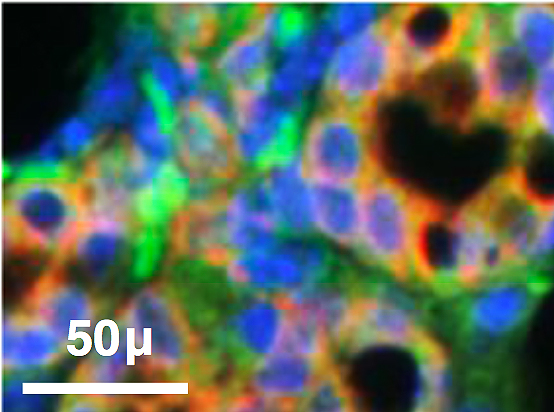
Preparation of the Mammary Gland for Lactation
During pregnancy, a subgroup of cells in the mammary gland begins to rapidly proliferate and to differentiate into milk-producing cells. These changes occur, in part, as a result of stimulation by the hormone prolactin, which activates the STAT5 transcription factor, a key activator of milk protein-encoding genes. However, a… Read MoreSep. 15, 2017
-
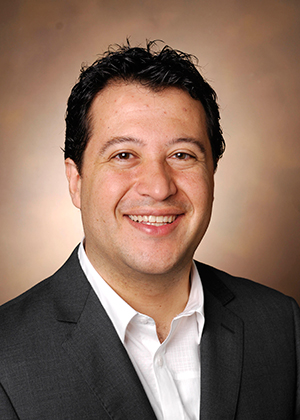
Lopez named Vanderbilt’s liaison to Oak Ridge National Laboratory
Carlos F. Lopez, assistant professor of biochemistry and biomedical informatics, has been appointed as Vanderbilt University’s liaison to Oak Ridge National Laboratory, the U.S. Department of Energy’s largest science and energy laboratory conducting research in energy and security. Lopez will continue the many collaborations that Greg Walker, associate professor of mechanical engineering,… Read MoreAug. 31, 2017
-

Sugars in human mother’s milk are non-toxic antibacterial agents
Mother’s milk, which consists of a complex and continually changing blend of proteins, fats and sugars, helps protect babies against bacterial infections. In the past, scientists have concentrated their search for the source of its antibacterial properties on the proteins it contains. However, an interdisciplinary team of chemists and doctors at… Read MoreAug. 25, 2017
-

Oxidative stress on the brain
Smith-Lemli-Opitz syndrome (SLOS) is a rare disease that occurs when patients inherit from both parents defects in the Dhcr7 gene, which encodes the last enzyme in the cholesterol biosynthesis pathway. A large portion of SLOS patients exhibit autism spectrum disorder (ASD) behaviors. Now in a paper published last month in the journal Genes, Brain and Behavior, Fiona… Read MoreAug. 25, 2017
-

A positive approach to Rett syndrome
A new drug reverses some cognitive deficits in a mouse model of Rett syndrome by stimulating a molecular receptor in the brain involved in learning. The findings were presented today at the 2015 Society for Neuroscience annual meeting in Chicago. The receptor, called mGluR7, binds to the chemical messenger glutamate in the brain’s… Read MoreAug. 23, 2017
-
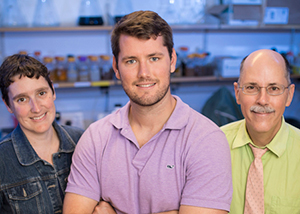
Discovery sheds light on protein key to nerve cells’ myelin sheath
Genetic mutations in PMP22 (peripheral myelin protein 22) cause a variety of peripheral neuropathies, underscoring the importance of the protein to a healthy peripheral nervous system. But the precise function of PMP22, a major component of the myelin sheath that surrounds and insulates peripheral nerve cell axons, has been unclear. Now,… Read MoreAug. 17, 2017
-
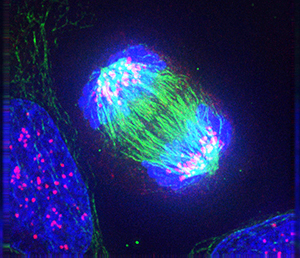
Path to Successful Cytokinesis
When we think of mitosis, the intricate process of DNA replication followed by precise alignment of the duplicated chromosomes and their distribution to the daughter cells comes immediately to mind. However, equally important is the process of cytokinesis by which the remainder of the cell’s contents are equally divided… Read MoreAug. 14, 2017
-
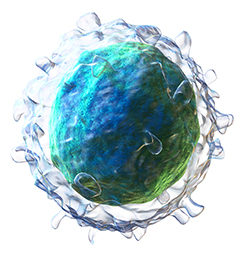
Newly Discovered Critical Step in B Cell Development
Histone deacetylases (HDACs) are enzymes that remove the acetyl groups from acetylated lysine residues of histones. The reaction produces a positively charged, unmodified lysine residue that enables the histone to interact more tightly with negatively charged DNA. In general, this promotes packaging of DNA into chromatin, thereby suppressing its… Read MoreJul. 27, 2017
-

Shyr named chair of Department of Biostatistics
Yu Shyr, Ph.D., Harold L. Moses Professor of Cancer Research and director of the Vanderbilt Center for Quantitative Sciences, has been named chair of Vanderbilt’s Department of Biostatistics. He will assume the post Sept. 1. As the new chair, Shyr will spearhead a department recognized internationally for its research and educational… Read MoreJul. 27, 2017
-

Drivers of breast cancer metastasis
Overexpression of HER2 (human epidermal growth factor receptor 2) is found in about 25 percent of breast cancers and is associated with poor outcomes. HER2-amplified breast cancers use signaling through a complex of proteins called mTORC2 to drive tumor formation, tumor cell survival and resistance to HER2-targeted therapies. Rebecca Cook, Ph.D.,… Read MoreJul. 27, 2017